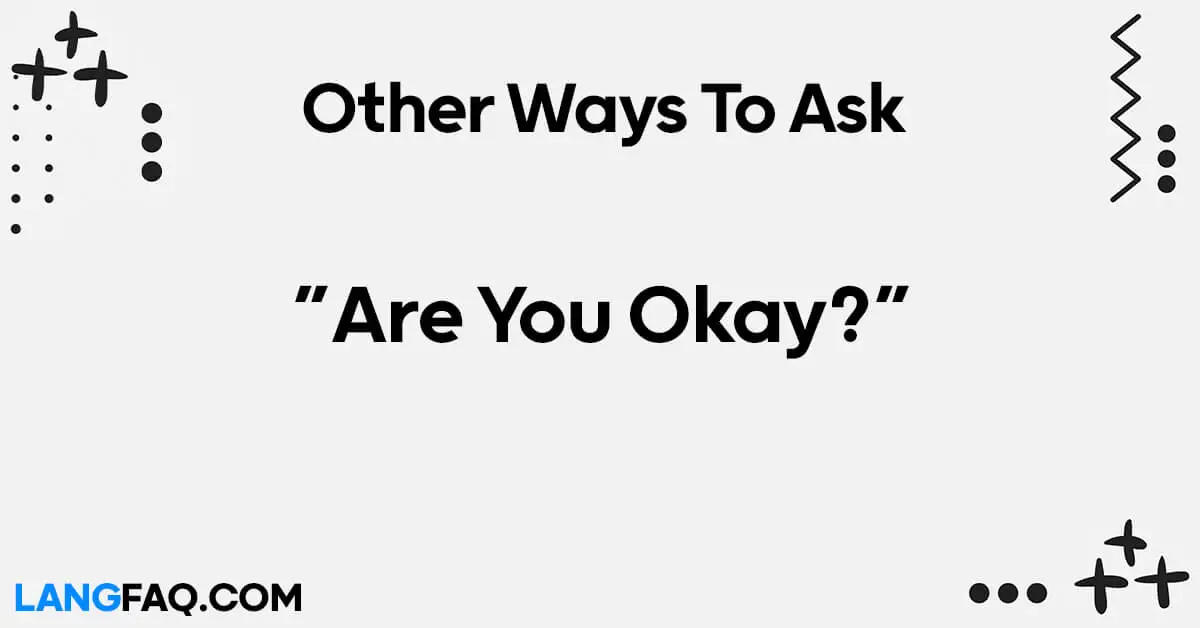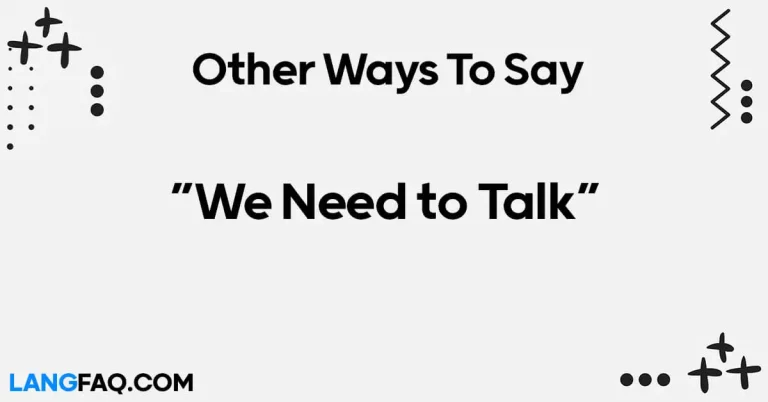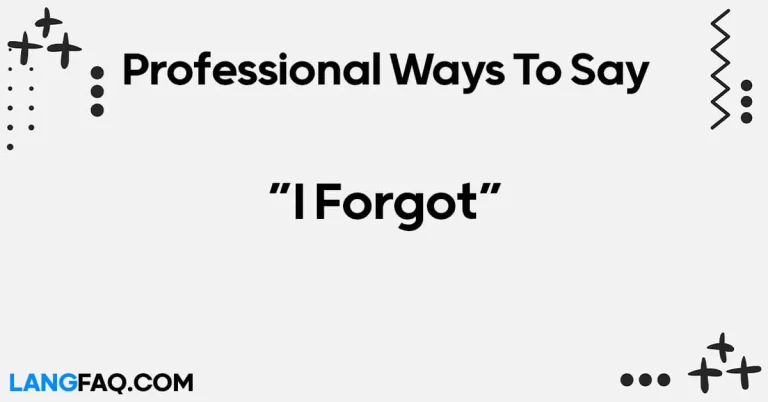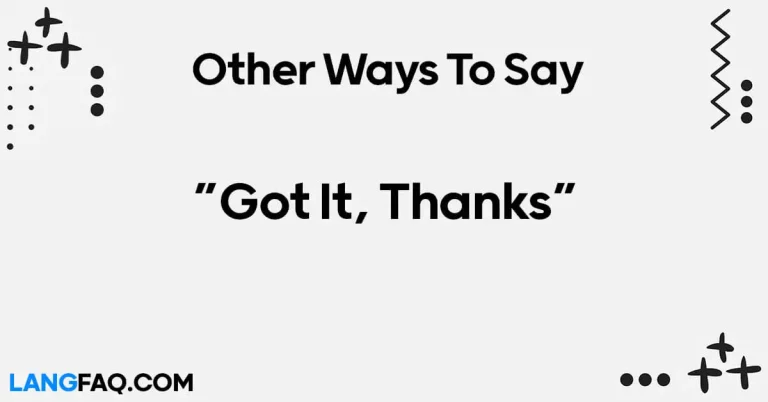In a world filled with challenges, expressing genuine concern for others is a crucial aspect of building strong relationships. This article explores various ways to ask the simple yet profound question, “Are You Okay?” Through engaging narratives and expert advice, we unravel 12 alternative phrases that can foster deeper connections and understanding.
12 Other Ways to Ask “Are You Okay?”
Here are 12 alternative ways to ask “Are You Okay?”:
- How are you holding up?
- Is everything alright with you?
- Are things going smoothly for you?
- How’s your day treating you?
- Any challenges on your plate right now?
- Is there something bothering you?
- How’s life treating you at the moment?
- Are you managing well?
- Any rough patches you’re navigating?
- Is there anything you’d like to talk about?
- How are you feeling today?
- Is everything going well in your world?
Here’s a table with meanings and examples for the 12 alternative ways to ask “Are You Okay?”:
| Alternative Phrase | Meaning | Example |
|---|---|---|
| How are you holding up? | Inquiring about someone’s well-being or state. | “Hey, I heard about the tough week you had. How are you holding up?” |
| Is everything alright with you? | Checking if everything is fine in their life. | “You seem a bit off today. Is everything alright with you?” |
| Are things going smoothly for you? | Asking about the ease of their current situation. | “I hope things are going smoothly for you during this busy time.” |
| How’s your day treating you? | Checking on their overall experience of the day. | “Hey, quick question: How’s your day treating you so far?” |
| Any challenges on your plate right now? | Inquiring about current difficulties. | “I know you’ve been juggling a lot lately. Any challenges on your plate right now?” |
| Is there something bothering you? | Asking if there’s a specific concern. | “You seem a bit preoccupied. Is there something bothering you?” |
| How’s life treating you at the moment? | Checking on their overall life experience. | “We haven’t caught up in a while. How’s life treating you at the moment?” |
| Are you managing well? | Inquiring about their ability to cope. | “With all the recent changes, are you managing well?” |
| Any rough patches you’re navigating? | Asking about challenges they may be facing. | “We all hit rough patches. Any you’re navigating through right now?” |
| Is there anything you’d like to talk about? | Inviting open communication. | “I’m here for you. Is there anything you’d like to talk about?” |
| How are you feeling today? | Checking on their emotional state. | “I noticed you’ve been quiet. How are you feeling today?” |
| Is everything going well in your world? | Asking about their overall situation. | “I hope everything is going well in your world right now.” |
These alternative phrases provide a variety of ways to express concern and inquire about someone’s well-being. Tailoring your question to the situation and using a more personalized approach can lead to more meaningful and open conversations.
Is It Correct to Say “Are You Okay?”?
Is It Correct to Say “Are You Okay?”
Addressing the correctness of saying “Are You Okay?” is crucial, as language nuances and cultural considerations play a role in effective communication. Let’s explore the appropriateness of this common phrase.
When to Use “Are You Okay?”
The phrase “Are You Okay?” is widely accepted and appropriate in various situations. It’s a straightforward and caring inquiry commonly used to check on someone’s well-being, both in formal and informal settings.
Examples:
- Informal Conversations:
- “You seem a bit quiet today. Are you okay?”
- Professional Settings:
- “I noticed you seemed stressed during the meeting. Are you okay?”
Variations of the Phrase:
While “Are You Okay?” is widely accepted, using alternative phrases can add depth and personalization to your expressions of concern. The variations discussed earlier, such as “How are you holding up?” or “Is everything alright with you?” provide alternative ways to ask the same question with slight nuances.
Examples:
- “How are you holding up after the challenging week?”
- “Is everything alright with you, or is there something on your mind?”
Cultural Sensitivity:
It’s essential to consider cultural differences when using expressions related to well-being. In some cultures, direct inquiries about one’s emotional state might be less common or might require more subtle phrasing. Understanding the cultural context ensures that your expression of concern is well-received.
Example:
- Western Culture:
- “I noticed you’ve been quiet. Are you okay with sharing what’s on your mind?”
- Eastern Culture:
- “I sense something may be bothering you. If you’re comfortable, would you like to talk about it?”
Grammar and Usage Rules:
The phrase “Are You Okay?” adheres to standard English grammar rules. It is a correct and concise way to form a question about someone’s well-being. However, in more formal contexts, you might opt for a slightly more elaborate expression to convey similar sentiments.
Example:
- “I hope everything is well with you.”
Tips for Effective Use:
- Context Matters: Consider the context and your relationship with the person before using the phrase.
- Tone and Delivery: Pay attention to your tone and delivery to ensure your genuine concern is conveyed appropriately.
- Be Open to Responses: Be prepared for various responses, and respect the person’s choice not to share if they’re not comfortable.
Professional Mail Example With “Are You Okay?”
Subject: Checking In – Are You Okay?
Dear [Recipient’s Name],
I trust this email finds you well. As we navigate through our busy schedules and work commitments, I wanted to take a moment to check in on a more personal level.
I’ve noticed that the recent workload has been demanding, and I wanted to inquire about how you’re holding up. Your well-being is important to us, not just as a colleague but as a valued member of our team.
If you find the time, I would appreciate it if you could share how you’re managing the current workload and if there’s anything specific you need assistance with. Our team is here to support each other, and your comfort and productivity are of utmost importance.
Remember, it’s okay not to be okay, and reaching out for support is a strength, not a weakness. We all go through challenging periods, and having an open dialogue is key to fostering a healthy work environment.
Please feel free to respond at your convenience, and if you prefer a one-on-one discussion, I am more than happy to schedule a meeting. Your well-being is our priority.
Thank you for your dedication and hard work. We appreciate all that you bring to the team.
Best regards,
[Your Full Name] [Your Position] [Your Contact Information]
How are you holding up?
Expressing genuine concern about someone’s well-being is crucial, especially when you sense they might be going through a challenging time. The phrase “How are you holding up?” is versatile, suitable for both formal and informal contexts.
Scenario:
Imagine a colleague who has been working long hours recently, and you’ve noticed signs of exhaustion. Using “How are you holding up?” conveys empathy and acknowledges their efforts without prying too much.
Example Sentence: “Hey, I’ve noticed you’ve been putting in extra hours lately. How are you holding up? Need any support?”
Variations:
- Informal with Friends:
- “I know life’s been throwing a lot at you lately. How are you holding up?”
- Mentor-Mentee Context:
- “I understand this project might be challenging. How are you holding up, and how can I assist you?”
Email Sample:
Subject: Checking In – How Are You Holding Up?
Hi [Colleague/Friend’s Name],
I hope this email finds you well. I’ve noticed the hard work you’ve been putting into the recent projects. How are you holding up? If there’s anything you need or if you want to talk, I’m here.
Best, [Your Name]
Is everything alright with you?
This phrase is a straightforward and caring way to check on someone’s overall well-being. It’s suitable for various situations, both personal and professional.
Scenario:
Picture a friend who has been acting differently lately. Using “Is everything alright with you?” shows you’ve noticed a change and are genuinely concerned.
Example Sentence: “You haven’t been your usual self lately. Is everything alright with you? I’m here if you want to talk.”
Variations:
- Professional Context:
- “I’ve noticed a shift in your performance. Is everything alright with you professionally?”
- Colleague to Colleague:
- “You seem a bit off during meetings. Is everything alright with you at work?”
Email Sample:
Subject: Checking In – Is Everything Alright?
Dear [Friend/Colleague’s Name],
I’ve noticed some changes in your behavior lately. Is everything alright with you? If there’s anything on your mind or if you need support, I’m here for you.
Best regards, [Your Name]
Are things going smoothly for you?
Inquiring about the ease of someone’s current situation, “Are things going smoothly for you?” is a positive and open-ended way to show interest in their life.
Scenario:
Consider a friend who has recently moved to a new city. Using this phrase acknowledges the significant change and expresses curiosity about their adjustment.
Example Sentence: “I heard you’ve settled into the new city. Are things going smoothly for you, or is there anything you find challenging?”
Variations:
- Colleague in a New Role:
- “Transitioning to a new role can be challenging. Are things going smoothly for you?”
- Friend’s Personal Changes:
- “I know you’ve made some lifestyle changes. Are things going smoothly for you on this new journey?”
Email Sample:
Subject: Catching Up – Are Things Going Smoothly?
Hi [Friend/Colleague’s Name],
I’ve heard about the recent changes in your life. Are things going smoothly for you, or is there anything you’d like to share? Looking forward to catching up.
Best, [Your Name]
How’s your day treating you?
Asking “How’s your day treating you?” is an informal yet caring way to check in on someone’s immediate experiences. It’s a versatile phrase suitable for friends, colleagues, or even acquaintances.
Scenario:
Imagine a friend who has had a particularly busy day at work. Using this phrase shows empathy and invites them to share without being intrusive.
Example Sentence: “Hey, I heard you had back-to-back meetings today. How’s your day treating you? Anything you want to share or decompress about?”
Variations:
- Casual Colleague Interaction:
- “I saw your schedule today. How’s your day treating you? Any wins or challenges so far?”
- Meeting an Acquaintance:
- “We haven’t caught up in a while. How’s your day treating you?”
Email Sample:
Subject: Quick Check-In – How’s Your Day Treating You?
Hi [Friend/Colleague’s Name],
I know you had a busy day lined up. Just wanted to check in – how’s your day treating you? If there’s anything you’d like to share or discuss, feel free to reach out.
Best regards, [Your Name]
Any challenges on your plate right now?
Expressing concern about challenges someone might be facing is essential for providing support. “Any challenges on your plate right now?” invites them to open up about difficulties without prying.
Scenario:
Consider a colleague who has been managing multiple projects. Using this phrase acknowledges their workload and shows willingness to assist.
Example Sentence: “I’ve seen you juggling multiple projects. Any challenges on your plate right now? I’m here to help if needed.”
Variations:
- Professional Support:
- “I know you’re handling a lot. Any challenges on your plate right now that we can discuss or solve together?”
- Friend Providing Support:
- “Life can get tough. Any challenges on your plate right now? Let me know how I can support you.”
Email Sample:
Subject: Supportive Check-In – Any Challenges?
Dear [Friend/Colleague’s Name],
I’ve noticed the workload lately. Any challenges on your plate right now? Don’t hesitate to let me know if there’s any way I can support you.
Best, [Your Name]
Something on Your Mind?
Inviting open dialogue with “Something on Your Mind?” is a gentle way to show you’re ready to listen. It’s suitable for friends, colleagues, or anyone you want to support.
Scenario:
Imagine a friend who seems lost in thought. Using this phrase lets them know you’re available for a conversation.
Example Sentence: “You’ve been quiet lately. Something on your mind? If you want to talk or share, I’m here for you.”
Variations:
- Colleague at Work:
- “I noticed you’ve been deep in thought during meetings. Something on your mind work-related, or is it something else?”
- Checking In with a Friend:
- “We haven’t caught up in a while. Something on your mind that you’d like to talk about?”
Email Sample:
Subject: Open Invitation – Something on Your Mind?
Hi [Friend/Colleague’s Name],
I’ve sensed you might have something on your mind. If there’s anything you want to discuss or share, know that I’m here for you. Let’s catch up soon.
Warm regards, [Your Name]
Can I Offer Support?
Extending a helping hand with “Can I Offer Support?” shows your willingness to be there for someone. This phrase is versatile, suitable for both personal and professional contexts.
Scenario:
Imagine a colleague who has expressed feeling overwhelmed. Using this phrase demonstrates your readiness to assist without assuming their needs.
Example Sentence: “I heard you’ve been swamped with deadlines. Can I offer support? Whether it’s sharing the workload or providing insights, I’m here for you.”
Variations:
- Mentor Offering Help:
- “Navigating a new project can be challenging. Can I offer support in any way to make the process smoother for you?”
- Friend Providing Assistance:
- “Life can be hectic. Can I offer support? Whether it’s a listening ear or practical help, just let me know.”
Email Sample:
Subject: Offering Support – Can I Help?
Dear [Friend/Colleague’s Name],
I’ve heard about the workload you’re managing. Can I offer support? If there’s anything specific you need assistance with, please feel free to reach out.
Best, [Your Name]
Do You Need to Talk?
Creating a safe space for expression, “Do You Need to Talk?” communicates your availability to listen without judgment. It’s a compassionate way to offer support.
Scenario:
Imagine a friend who has been going through a tough time. Using this phrase lets them know you’re ready to listen whenever they’re comfortable.
Example Sentence: “You’ve seemed a bit distant lately. Do you need to talk? I’m here whenever you’re ready to share.”
Variations:
- Colleague in a Professional Context:
- “I’ve noticed changes in your demeanor. Do you need to talk about anything work-related or personal?”
- Supportive Friend:
- “Life can throw curveballs. Do you need to talk? Whenever you’re ready, I’m here to lend an ear.”
Email Sample:
Subject: Here for You – Do You Need to Talk?
Hi [Friend/Colleague’s Name],
I’ve noticed you’ve been going through a challenging time. Do you need to talk? Whenever you’re ready, I’m here to listen and offer support.
Warm regards, [Your Name]
I’m Here for You
Assuring support with a personal touch, “I’m Here for You” is a comforting phrase suitable for various situations. It conveys a sense of reliability and care.
Scenario:
Consider a friend who has recently faced a setback. Using this phrase reinforces your commitment to being a supportive presence.
Example Sentence: “I heard about the challenges you’re going through. Just want you to know, I’m here for you. Whatever you need, I’ve got your back.”
Variations:
- Professional Support:
- “Dealing with work pressures can be tough. I’m here for you. Let’s discuss how we can navigate this together.”
- Family Assurance:
- “Family matters can be challenging. I want you to know I’m here for you, no matter what.”
Email Sample:
Subject: Supportive Reminder – I’m Here for You
Dear [Friend/Colleague’s Name],
I’ve heard about what you’re going through. I want to remind you that I’m here for you. If there’s anything you want to talk about or if you need support, I’m just a message away.
Best, [Your Name]
Let’s Catch Up
Blending care with casualness, “Let’s Catch Up” is an inviting phrase that creates a relaxed atmosphere for sharing. It’s suitable for reconnecting with friends, colleagues, or acquaintances.
Scenario:
Imagine a friend you haven’t seen in a while. Using this phrase suggests a desire to hear about their life without putting pressure on them.
Example Sentence: “We haven’t caught up in ages. Let’s catch up! How’s everything going in your world?”
Variations:
- Colleague After a Break:
- “We’ve both been so busy. Let’s catch up during lunch. How’s everything going on your end?”
- Reconnecting with an Acquaintance:
- “It’s been too long. Let’s catch up over coffee. How have things been going for you?”
Email Sample:
Subject: Reconnecting – Let’s Catch Up!
Hi [Friend/Colleague’s Name],
It’s been a while since we caught up. Let’s change that! How about we schedule some time to grab a coffee and catch up on everything that’s been happening?
Looking forward to reconnecting, [Your Name]
How’s Your Day Going?
Encouraging sharing in daily experiences, “How’s Your Day Going?” is a friendly and open-ended way to check in. It’s suitable for both personal and professional contexts.
Scenario:
Consider a colleague you run into during a break. Using this phrase is a casual way to engage in a conversation about their day.
Example Sentence: “Hey, quick question: How’s your day going? Any interesting highlights or challenges so far?”
Variations:
- Informal with Friends:
- “I know we’re both busy, but I wanted to check in. How’s your day going? Anything exciting happening?”
- Professional Context:
- “We haven’t touched base today. How’s your day going on the work front? Anything you want to discuss?”
Email Sample:
Subject: Quick Check-In – How’s Your Day Going?
Hi [Friend/Colleague’s Name],
I hope your day is going well. Quick check-in: How’s your day going so far? If there’s anything you want to share or discuss, feel free to let me know.
Best regards, [Your Name]
Are You Coping Well?
Addressing coping mechanisms subtly, “Are You Coping Well?” shows sensitivity to potential challenges someone might be facing. It’s suitable for both personal and professional relationships.
Scenario:
Imagine a friend who has recently experienced a loss. Using this phrase acknowledges the difficulty of the situation and expresses care.
Example Sentence: “I heard about your loss. Are you coping well? If there’s anything you need or if you want to talk, I’m here for you.”
Variations:
- Colleague in a Professional Context:
- “I understand the project has been intense. Are you coping well with the workload? Let’s discuss how I can assist.”
- Family Support:
- “Family situations can be challenging. Are you coping well? If you need someone to talk to, I’m here.”
Email Sample:
Subject: Supportive Inquiry – Are You Coping Well?
Dear [Friend/Colleague’s Name],
I’ve heard about the recent challenges you’re facing. I just wanted to check in – are you coping well? If there’s anything you’d like to share or discuss, know that I’m here for you.
Warm regards, [Your Name]
FAQ
Can using alternative phrases make a difference?
Absolutely. Using varied expressions shows creativity and genuine concern, making the other person feel more valued and understood.
How often should I ask someone if they’re okay?
The frequency depends on your relationship and the context. For close friends, regular check-ins may be natural, while in professional settings, occasional inquiries suffice.
Are there situations where I shouldn’t ask this question?
While it’s generally positive, be mindful of the context. Avoid pushing someone to share if they seem uncomfortable, and respect their boundaries.
Can I use these phrases in professional settings?
Yes, many of these alternatives are suitable for professional contexts. Choose phrasing that aligns with the nature of your relationship with the person.
What if someone doesn’t want to talk?
Respect their decision. Let them know you’re available whenever they’re ready and offer support without pressuring them to share.
Is it essential to use alternative phrases, or can I stick to the classic “Are You Okay?”
While the classic phrase is effective, using alternatives adds depth and personalization to your expressions of concern.
Conclusion:
In a world where genuine connections are invaluable, mastering the art of asking, “Are You Okay?” can profoundly impact relationships. Through diverse and thoughtful expressions, we create spaces for open dialogue, fostering empathy, trust, and support. So, go ahead, choose your phrase, and make a positive difference in someone’s day.







